

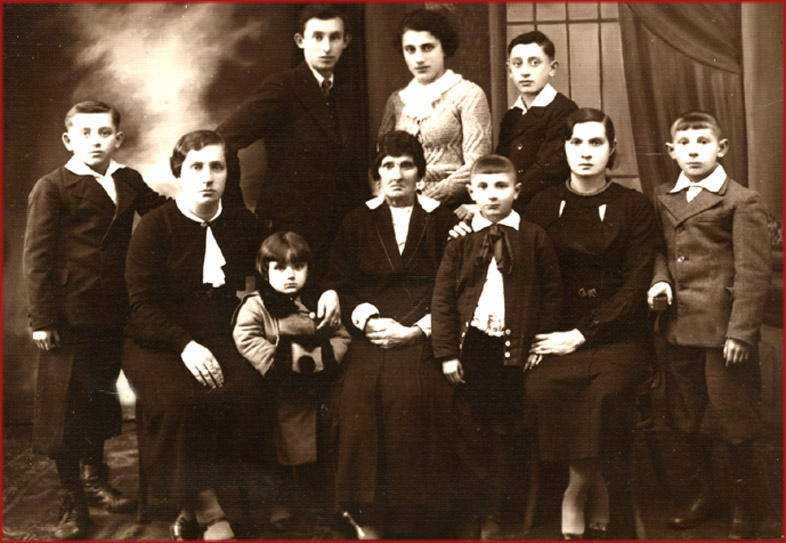
THE PTAK FAMILY (Vengrov, 1936)
Front row, l-r: Pesach, Tsivya, Srul Usha's daughter, Ruchel,
the widow and children of Ruchel's youngest son. Back row: Leo, Clara, Rivim.
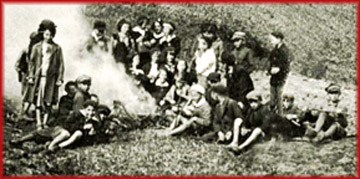
Vengrov children playing in a field (ca. 1930)
Seasons in Vengrov: Some winters it snowed almost every day. The early snow would stay frozen until spring. Winter mornings were cold, even though our oven was heated with wood and coal. Frost formed on the window, in patterns that looked like leaves and trees. The nights were long and the low houses were snowed under. People had to dig themselves out in the morning. Some nights, the moon and the stars made the snow sparkle like diamonds. On nights like that, boys and girls went ice skating on the townís frozen streets. We used blades tied around our shoes with rope and sticks.
On the way to the new Polish school, we passed over a little bridge under which ran the Stryga, a small stream. Behind it stood Kleinís mill. Next to that was a large pond. In winter, we ice-skated on the pond and in summer, we swam in it. Summers were hot and dry in Vengrov and there was not much rain. It was a time for sports: soccer, volleyball, swimming, and ping pong. We also had outdoor picnics by the Liwiec, a river that passed through Vengrov, then ran into the Bug River near Warsaw. I was so busy in summer that I was seldom home. My dear mother, God bless her soul, was in constant fear because she knew that the Liwiec was deep and cold, with a swift and sometimes rough current.
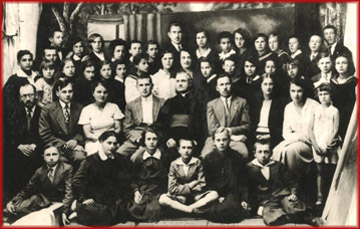
Children in Vengrov's Polish school.
My Schooling : I was four years old when I first went to the Polish school. It was a small schoolhouse in a wooden building painted white and greatly in need of repair. The school sat on a rise that looked down on the Stryga below. We were taught in the Polish language. In this Polish school, we were introduced to silent movies. Once a week, we watched Charlie Chaplin, Buster Keaton, Harold Lloyd, and old cartoons. The next school I went to was called the German School, because Germans lived on that street. It was the street that had the only movie house in town, which was open only on weekends and showed silent films. I loved the movies. When a couple went to the movies, I would sneak in behind them.
I also went to cheder. My teacher was a small thin man with such a sparse beard that you could count the small number of yellow-brown hairs in it. Our teacher had a wife and an unattractive daughter. He was a chain smoker who sat at the head of the table rolling his own cigarettes with his nicotine-stained fingers and sniffing from his snuff box . I learned to read and write Yiddish and studied the Bible. I liked to read books in Yiddish by Tolstoy, Zola, and Dostoyevsky. But my true loves were my girlfriend Bola and sports.
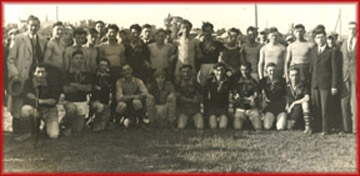
Leibl's soccer team (1936)
Childhood Activities: The first and only toy I ever had was a three-wheeled bike. How proud I was to ride it outdoors! That bike was my greatest joy, until the day I saw a little black puppy crawling on the floor. That was love at first sight. Her name was Lolka. She was our familyís dog; but mostly, she was mine. She grew and had puppies of her own. On a sunny spring day when the sky was as blue as the sea, Lolka up and left us, never to return. We looked everywhere for her, but finally stopped searching. It was one of the saddest days of my childhood.
We all grew up in the streets, on our own in the clubhouse or on the fields that were our playgrounds. I loved to play soccer. We used rubber balls or shmates [rags] tied with rubber bands. We used rocks for goal posts. We kids were serious players.
One day when I was about five or six years old, I was in cheder learning the prayer book. My friend Moishele whispered to me, "Leibele, the ball game is on!" I snuck out of cheder, climbed a wall, and jumped. My right hand hit a rock below the wall and I broke it. I had to be carried home, then was placed on a wagon. Two horses shlepped me to the Klemovizna Hospital on the road to Sokolov, while my mother screamed the whole way. I was fitted with a hard cast from my shoulder to my fingertips.
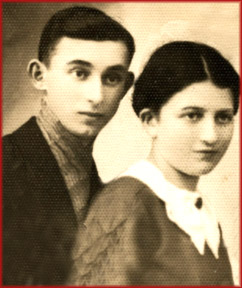
Leibl and his girlfriend Bola
When I was 12 years old, I joined the Shomer Tsion [Guardians of Zion], a left-of-center Zionist group. It was there that I found Bola, the love of my youth. She was 12 too and was the prettiest girl in town. I carried on a silent love with her. We spent nights and days together and not a word was spoken. She was my girlfriend for five years, until I left Vengrov.
Around the Town: There was a gas station in Vengrow. It had no walls, no roof, and no floor. There was just one gas pump. It was the only one in town. But why? We had no cars, no fire trucks, no garbage trucks.
We feared the sound of the only fire bell, especially during the night, when you could see the fire from far away. Early one morning, a fire broke out on the corner of our street, about five or six houses from ours. By the time the fire was put out, a mother and her three children had died. When I returned to Vengrov a few years ago, that scorched corner, that piece of ground, still was fenced in. It is sacred land.
Once I was in our shoe store and my mother was very upset and excited. She had received a notice that the tax people were coming that day, to audit our inventory. My brother Moishe and Mom started moving furniture that covered a secret door in the floor. Then they threw boots and shoes down the hole, leaving most of the shelves empty. A policeman came in and whispered into Momís ear, after which a second man walked into the store. He was dressed in a long coat and was wearing a hat and glasses. He counted the shoes and made up some numbers. The fine was very small. Mom paid him in zlotys and it was over; but again, I understood fear.
Town Characters: We had a town water carrier, who carried two buckets of fresh water, mostly on Fridays, and sold it to housewives for shabbes tea. He got a couple of groschen for the water.
Every shtetl had a town meshugena {crazy person] and so did ours. She was ill and harmless. She was married to a nice husband and had lovely children. Her daughter Malka was my friend.
When someone got sick, the doctor was never around. Even the hunchback, who was half-doctor, half-barber failed to show. Sooner or later someone came. The patient was put to bed, he was bled, then they applied glass cups. A cotton stick was dipped in alcohol and then they stuck the cups to the person. It didnít do any good.
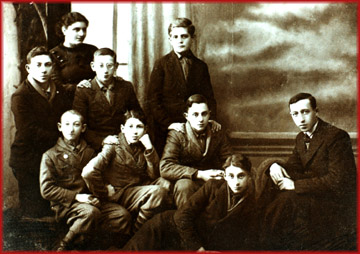
Leibl and his Vengrov friends
Leaving Vengrov: Many years passed. One day a letter came from Dad in New York. It was short. Inside we found tickets. We were going to America!
Many people came to say goodbye at the bus stop. My head was spinning and my heart was heavy. From that morning on, my life was transformed. We abandoned our home, the place of our birth, the town and its people. I left my heart with Bola and the people of Vengrov.
The bus brought us to Warsaw and the American consulate. We spent three days there, trying to secure our visas. Everyone passed the test except me. My mind was in Vengrov. I was 17 years old and I did not want to leave. "Why donít you answer the questions? Why donít you read?" Mom pleaded. "We wonít leave you. We all go or we all stay." When she said that, I knew my fight was lost. I answered the questions and we got the visas.
The next day, we went to the train station. Bola and her girlfriend were waiting there. We hugged and kissed. The train whistle sounded and we boarded. Slowly, it pulled away, leaving a smell and dark smoke behind. Through the window, I saw my dear ones running after us and waving. They became smaller and smaller and then they were gone. I never saw them again, ever. Bola perished in the Holocaust. I miss her still and say kaddish [the memorial prayer] for her.
The train brought us to the Polish seaport of Gdansk-Gdynia. We boarded a Polish ship, the Pilsudski, to cross the ocean to America and New York City. It was a long and severe journey, a stormy crossing. The ocean was deep and the waves seemed to be as high as the sky. The ship would leap up, trying to catch the sky, and the sky seemed to be falling. The nights were not any better. Pesach was very sick and was kept in the infirmary the whole time. The rest of us spent our days vomiting frequently while lying on the deck, which rocked like a wild cradle.
After two weeks of agony and pain, we pulled into New York harbor. When we disembarked, I was wearing my long winter coat and a Yiddish cap. I looked like a yokel from the past. Bewildered and confused, I noticed a man amongst a few people waving. In that moment, I went back in time. "Is that him?" I thought. Gone was the professorial black beard. He was clean shaven, had a grayish moustache, and was gray around the temples.
That man standing there waving was my dear father. We all hugged and kissed politely. After all those years of separation, we were strangers. The people with him helped us to get to our new home on Avenue B and Fifth Street in Manhattan. In the year 1936, on Thanksgiving Day, so began a new chapter in my life.
Many years have passed since my family and I left Vengrov. I still have dreams that bring me back there. In my dreams, I see people that I knew, but they wonít speak to me. When I awake, all is forgotten. I am almost 89 years old. It is time to close the chapter and make plans for the future.
For the first part of Leo Ptak's memoir, click here.
Credits: Text and photographs copyrighted © 2008 by Leo Ptak. Text edited and page designed by Helene Kenvin. Page created by Helene Kenvin. All rights reserved.